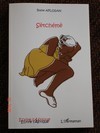by A. I. ASIWAJU (1974)
|
Notes et références (1) Archives nationales du Sénégal (Fonds Dahoméen), Dakar (2) Djivo, J. A. «, HUNKANRIN (Louis) », Dictionnaire-bio-Bibliogra- (3) The indigénat code, which originated in Algeria in 1874 and was eventually applied to French Tropical Africa, empowered administrators to impose summarily on subject peoples (as distinct from the assimilés or citizens) sanctions of fines, imprisonment and exile for a large variety of administrative and political offences. In Dahomey, as elsewhere in the French African dependencies up to the end of the Second world war when the code was abolished, this practice rendered French rule extremely oppressive. (4) Dov Ronen has attempted a comprehensive survey of the Dahomeyan news-papers published during the colonial period and he has corne across this problem. See his article. « The colonial! Elite in Dahomey », in African Studies Review, XVII, 1, 1974. (5) It is hoped that someone will in the very near future under- (6) In this paper, nationalism is defined as a sum-total of ideas (-7) Glele, M., Naissance d'un Etat Noir (L'Evolution politique et constitutionnelle: du Dahomey, de la Colonisation à nos jours), Paris, 1969. The idiom may be translated as 'the liar shall be shamed', or the truth shall triumph. (8) Djivo, op. cit., page 97. (9) For a note on Biaise Diagne, see Jonhson, G.W. The Ascendancy of Blaise Diagne and the Beginning of African Politics in Sénégal', Afrir.a, XXVI (1966). (10) For further details on Francophone African leaders' attitude to independence before 1958, see Crowder, M., "Independence as a Goal in French West African Politics", in French-Speakinç Africa; The Search for Identity, ed, Lewis, W. H., New York, 1965, Pages 15-45 , and Adamolekuri, L. The Road to Independence in French Tropical Africa' Tarikh, vol. 2, N° 4, 1969 Pages 72-85. (11) Archives nationales du Dahomey, Porto-Novo (herafter A.N.D.) (12) The précision of this date is on the strengh of I. R. A. D. (13) Hunkanrin Papers, op cit., 'Assignation à Prévenu signé V. Nimar, Huissier près le tribunal de première instance de Cotonou, 28 Novembre 1935, au sujet de l'affaire 'La Voix du (14) Newbury, C.W., The Western Slaves Coast and Lts Rulers. (15) The succession tradition is in reference to the principle of alternation between recognised branches of the royal lineage, a practice found in most parts of Africa. (16) See Ballard, J. A., The Porto-Novo Incidents of 1923 : Politics in the Colonial Era, Odu, Vol. 2 N° 1, July 1965. (17) Emmanuel Mounier in Esprit, cited in Glele, op, cit., page 34. For sortie détails about Porto-Novian response to Western education, see Grivot, R., Réactions Dahoméennes, Paris (18) Djivo op. cit., page 94 and Ballard op. cit., page 64. (19) Ibid. (20) Glele, op. cit. page 32. (21) Hunkanrin Papers, op. cit., 'L'Instituteur-Stagiaire, Louis Hunkanrin en service à Ouidah, ancien élève de l'Ecole Normale de Saint-Louis à Monsieur le Gouverneur (du (22) Ibid., op. cit., Secrétariat-Général : Note pour Monsieur le Gouverneur, Porto-Novo, le 15 Janvier 1909, Signé illisible. (23) Ibid., Ouidah le 28 Juin 1907, le Directeur de l'Ecole Laïque à Monsieur l'Administrateur de Ouidah ; aslo Ouidah, le 1" Juillet (24) A. N. S., Série 8 G 45 (2.3), Fiches de Renseignements concernant !e nommé Hunkanrin interné (10 ans) par arrêté du 14 Avril 1923. (25) Djivo, op. cit., page 94, Ballard, op. cit., page 65. Djivo, op. cit., page 94 (27) A.N.D. Dossier de M. Hunkanrin, Louis, dated 1920 : N° 491/c Porto-Novo 31-10-1919, Lt-Gouverneur du Dahomey à M. le Commissaire Général des effectifs Coloniaux, 19, rue de (28) A.N.S., Série 8 G 45 (23) op. cit., A.N.D. Dossier de M. (29) Djivo, op. cit. (30) A. N. S., Série 8 G 45 (25) op. cit., 'Dossier de M. Hunkanrin op. cit., See A. N. S., Série 8 G 9, Rapport du Gouverneur-Général de l'A.O.F. au Ministre des colonies, le 8 Mars 1917. Noufflard's administration coincided with. the First World War which witnessed a widespread wave of armed revolts which stemmed largely reform the French policy of conscription and the governors' excessive brutalities in handling the situation (32) A. N. S., Série S G 44 (23), Confidential despatch N° 264, Couverneur Général au Ministre des colonies, 29-4-23. (33) A. N. S. Série 8 G 45 (23), Fiche de Renseignements concernant le nommé Hunkanrin...', already cited. (34) Djvo, op. cit. (35) I.R.A.D., Hunkanrin Papers, 'Le Commissaire-Général des Effectifs Coloniaux à M. le Ministre de la Guerre (Direction des Troupes Coloniales, Cabinet du Directeur), Paris, 12-2-1920. (36) A.N.S., Série 8G 52 (23), Gouverneur-Général de l'A.O.F. à M. le Ministre des Colonies, 7-3-2.3, op. cit. (37) I.R.A.D. Le Commissaire Général des Effectifs coloniaux à M. le Ministre de la Guerre, 12-2-1920. (38) Ibid. (39) Ibid. (40) A.N.S., Série 8 G 32 (23), Gouverneur-Général à M. le Ministre des colonies...' already cited. (41) I.R.A.D., Hunkanrin Papers, 73è Bataillon de Transition Saint Raphaël, Commandement des Camps de Saint-Raphaël, Etat-Major Cabinet N° 72 c/2, 26-1-20. (42) A.N.S., Série 8 G 45 (23), Fiche de Renseignements...', already cited. (43) Ibid.
(44) An auto-account of these hardships are contained in 'L'Esclavage en Mauritanie' in Etudes Dahoméennes, op. cit. (45( Djivo, op. cit., page 96. (46) Ibid. (47) Ibid., page 96 (48) Ibid.. page 96. (49) Ibid. Ibid., page 97 (51) Djivo, op. cit., page 96. In this particular Letter which he is said to hâve addressed to Blaise Kuassi in November 1932, he is quoted to hâve writen : 'Ce n'est pas la révolution que je The same consideration inspired the assimilatonist zeal apparent in educational policy and planning in colonial Africa especially in the period after the Second World War. See Presser (53) Ballard, op. cit., pages 65-66 and Djivo, op. cit., page 98 (54) A.N.S., Série 8 G 58 (23), 'Notes sur la Presse Dahoméenne'. Ballard, op. cit., page 64 (56) A.N.S., Série 8 G 58 (23), Notes sur la Presse Dahoméenne'. (57) See Etudes Dahoméennes (nouvelle série), n° 1, 1961), and n° 5, (58) A.N.S., Série 8 G 52 (23) Gouverneur-général de l'A.O.F. au Ministre des colonies, 7-3-23, Following Hunkanrin's reports of ill-treatment by prison authorities in Cotonou, complaints Djivo, op. ait., page 97 At Ijofin, e.g., both Sohingbe and Hunkanrin were repor-ted to have enjiaged in activities considered by the French to be injurious to their administration in Dahomey with particular reference to Porlo-Novo. Strongly worded petitions, drafted by Lagos-based Nigérian, letter writers such as O.H. Williams of Docemo Street,, were addressed against the French authorities in Dahomey ; and in 1916, efforts were made to enable Sohingbe, possibly with Hunkanrin, to go to France, from Lagos to solicit the support of their French sympathisers who might influence the Metropolitan government to effect changes in the Dahomeyan administration. See A.N.S., Série 8G 19 Lieutenant-Gouverneur du Dahomey au Gouverneur-Général de FA.O.F. 12-1-16. also Télégramme N° 37, Gouverneur-Général de l'A.O.F. au Lieutenant-Gouverneur du Dahomey, 184-1916, instructing negotiations with the British Government of Nigeria not to allow Sohingbe to embark any ship in Lagos. See Chapter 6 of Asiwaju, A.I. Western Yorubaland Under Colonial Rule the; revised version of an Ibadan doctoral thesis forthcoming as a book by Longmans in the Ibadan History series. (62) See Hunkanrin Papers, Léon Prouvost à Saint-Raphaël à Louis Hunkanrin au sujet de : « Qu'est-ce qu'un anarchiste ? » (undated).
(63) Langley, D.A. Pan-Africanism and Nationalism in West Africa, This phrase has been extracted from the personal letter which he wrote to the Governor of Dahomey in 1908 when he petitioned for promotion See I.R.A.D., Hunkanrin Papers, 'L'instituteur-Stagiaire, Louis Hunkanrin à Monsieur le Gouverneur', |








Commentaires